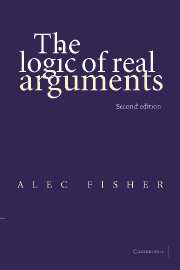Book contents
- Frontmatter
- Contents
- Preface to the first edition
- Preface to the second edition
- Acknowledgements
- 1 Introduction
- 2 A general method of argument analysis
- 3 A first example – from Thomas Malthus
- 4 Reasoning about nuclear deterrence
- 5 An example from John Stuart Mill
- 6 Arguments about God's existence
- 7 How do your mind and body interact?
- 8 Suppose for the sake of argument that …
- 9 An example from Karl Marx
- 10 Evaluating ‘scientific’ arguments. Some initial examples
- 11 Philosophical assumptions
- Appendix: Elementary formal logic
- Exercises
- Bibliography
- List of further reading
- Index
Preface to the first edition
Published online by Cambridge University Press: 05 June 2012
- Frontmatter
- Contents
- Preface to the first edition
- Preface to the second edition
- Acknowledgements
- 1 Introduction
- 2 A general method of argument analysis
- 3 A first example – from Thomas Malthus
- 4 Reasoning about nuclear deterrence
- 5 An example from John Stuart Mill
- 6 Arguments about God's existence
- 7 How do your mind and body interact?
- 8 Suppose for the sake of argument that …
- 9 An example from Karl Marx
- 10 Evaluating ‘scientific’ arguments. Some initial examples
- 11 Philosophical assumptions
- Appendix: Elementary formal logic
- Exercises
- Bibliography
- List of further reading
- Index
Summary
This book arose out of my experience of teaching logic. Like many others I hoped that teaching logic would help my students to argue better and more logically. Like many others, I was disappointed. Students who were well able to master the techniques of logic seemed to find that these were of very little help in handling real arguments. The tools of classical logic – formalisation, truth-tables, Venn diagrams, semantic tableaux, etc. – just didn't seem to apply in any straightforward way to the reasoning which students had to read in courses other than logic. At the same time I felt that it ought to be possible to give students some guidance – some procedure – which would help them to extract and to evaluate arguments from written texts and which would help them to write good arguments of their own. I wanted the procedure to be non-formal but to build upon the insights of traditional logic; this book attempts to realise that objective.
Many other teachers of logic and philosophy have had much the same experience in the past two decades and the result has been the emergence of what is now called the ‘informal logic and critical thinking movement’ in North America. One of the first books in this tradition was Monroe Beardsley's Practical Logic, a book which is still well worth reading over thirty years on. Stephen Toulmin's The Uses of Argument is another classic attempt at providing an alternative framework for understanding reasoning.
Information
- Type
- Chapter
- Information
- The Logic of Real Arguments , pp. vii - ixPublisher: Cambridge University PressPrint publication year: 2004
